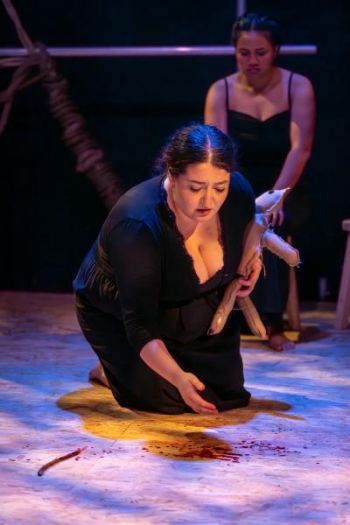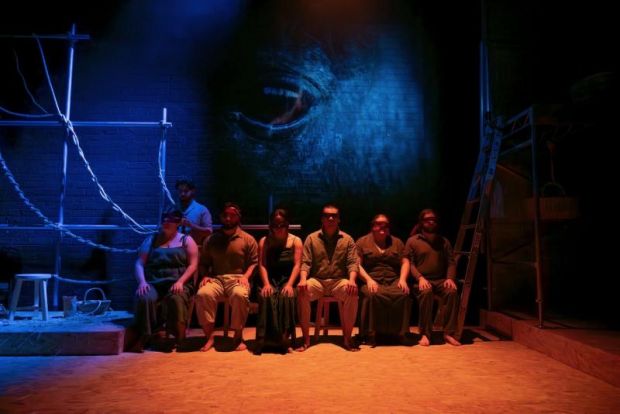Blood Wedding
Blood Wedding, written by Frederico Garcia Lorca in 1932, is about love, betrayal, family conflict and feuds in a rural setting, just prior to the bloody Spanish Civil War. It is a great source of inspiration for theatre makers, who relish the challenges of staging this play.
Deborah Leiser-Moore’s signature blend of visual, feminist and contemporary performance work seamlessly intertwines into this much loved dramatic-surrealistic play, with emphasis on physical movement enhancing the themes of love, family, boundaries, gender, morality and freedom. This is also a tale about female empowerment.
 Choreographed movements accommodate a cleverly devised set design (Harry Gill), with characters in designated areas going about their daily life. Rear projection provides symbolism and imagery that signifies strength, sexuality, and an unruly land. Janis Joplin’s “Piece of My Heart” sets the show ablaze as the audience take their seats while the actors mingle.
Choreographed movements accommodate a cleverly devised set design (Harry Gill), with characters in designated areas going about their daily life. Rear projection provides symbolism and imagery that signifies strength, sexuality, and an unruly land. Janis Joplin’s “Piece of My Heart” sets the show ablaze as the audience take their seats while the actors mingle.
Mother (Tess L. Steele) holds court on the left side of the stage; she is grieving the death of her husband and the recent death of her son who died in a knife fight with the notorious Felix family. Her grief and bitterness are evident as she peels and chops onions with angry zest, holding onto what remains of her family with zeal.
Her only surviving son, groom (Jonathon Pindiura) is madly in love and is to wed bride (Teresa Giansiracusa), who was to marry Leonardo Felix (Dion Zapantis), but her father (Connor Raselli) objected to his poor financial standing and bad familial line. The emotionally unsettled Leonardo is now married to wife (Mia Cannola) and they have their first-born. Weaver (Mohammed Al Ziady) is the single voiced chorus who expresses the collective emotions of the characters and the audience.

The wedding scene is joyous and oblivious to the fatal outcome; the wedding mimics Jewish and Arabic customs and provides a place for the Weaver to spin his yarns and celebrate and speak of conflict with subtle references to the current Palestinian crisis.
Bride and Leonardo provide a scintillating final dance sequence; heightened with fiery passion, it grips at the soul. The Weaver plays a pivotal role in the fatal revenge scene between the Groom and Leonardo, as he encourages the audience to reflect on senseless conflict and unreasoned emotive actions.

This is an outstanding production with much praise to the actors, creative team and the director for providing a scintillating and thought-provoking show. A rich, multi-layered production, it steps outside of its traditional theatrical space and provides new and exciting challenges for the audiences to experience.
Flora Georgiou
Images by smwimage
Subscribe to our E-Newsletter, buy our latest print edition or find a Performing Arts book at Book Nook.

